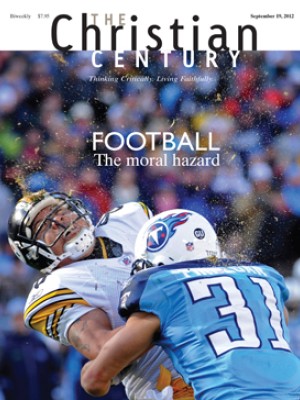Sunday, September 23, 2012: Proverbs 31:10-31
Enough water has passed under the bridge to allow us to take a second look at the virtuous woman of Proverbs 31.
Those of us who follow the lectionary have encountered the industrious woman of Proverbs 31 many times. Every three years she appears with her wool and flax, her distaff and spindle, her keen eye for both fashion and a good deal, her open hand to the poor, and her penchant for providing her husband bragging rights at the city gates. But we haven’t always welcomed her.
I left seminary in the early 1980s with every intention of ridding the church of unhealthy gender stereotypes like that of the virtuous wife. Those were the days when newly minted pastoral theologians like me were sniffing out all traces of masculine preference—in hymns, in prayers and especially in scripture. The New Revised Standard Version (copyright 1989) was in the works. Brothers addressed in the epistles would soon become brothers and sisters, and Jesus would not be calling disciples to become fishers of men but urging, “Follow me and I will make you fish for people” (Mark 1:17).
Read our latest issue or browse back issues.
One of the first funerals I conducted was for the matriarch of a large family whose roots ran deep in a small Virginia community. There was no question about what passages of scripture would be read. Like the saints who had gone before her, Mrs. Brown would have Proverbs 31 and John 14 read over her casket; then her grandsons would bear her body to the cemetery, where she would await entry into a “mansion” in her “Father’s house” (John 14:2–3, KJV). In her family’s estimation, Mrs. Brown was an archetype no less than the woman in the ancient acrostic poem in Proverbs, and she had earned her place in heaven.
I was foolish back then, but not foolish enough to oppose that plan. Of course Mrs. Brown was a sinner saved by grace, not works, and there was more to faithful service than being a virtuous wife. But that was not the moment to instruct the family in the fundamentals of Reformed theology or newfangled notions of the equality of the sexes.
At the grave I commended our sister to the Lord as “a lamb of your own flock, a sinner of your own redeeming,” but in the family pantheon she would remain “a capable wife far more precious than jewels.”
Back when I followed the family’s mandate, it felt like cowardice. Now it feels like wisdom.
Enough water has passed under the bridge to allow us to take a second look at this virtuous woman. She is indeed a marvel of enterprise and hard-nosed stewardship. She makes the ant in Aesop’s fable seem like a slacker. If you translated her duties into a modern job description, it would jibe with that of the most successful of CEOs. Today she would be running a corporation, selling a line of handmade clothing on the Home Shopping Network and chairing the local United Way. Her husband could brag about her if he wanted, but she would be far beyond the need for that kind of attention. She would be a self-made woman.
It appears that some ancient scribe saw this coming. R. B. Y. Scott thought that the original poet must have written something like “Charm is deceitful and beauty is passing; the intelligent woman is the one deserving praise.” But then along came that pious scribe, concerned that God isn’t mentioned anywhere in this paean to wise womanhood. He (and it had to be a he) added “who reverences the Lord,” making the verse read, “The intelligent woman who reverences the Lord is the one deserving praise” (The Anchor Bible: Proverbs and Ecclesiastes). As a Calvinist I am sympathetic: as admirable as this lady is, the glory belongs to God.
These days I’d welcome a family who’d want Proverbs 31 read at a funeral; in fact almost any passage of scripture would be welcome in lieu of the slide shows, sentimental poetry and self-therapy masquerading as eulogy. Any time a family requests an “open mike,” I can be pretty certain someone will share a funny story about the deceased that isn’t all that funny and reveals a lot more about the person holding the mike than about the person in the casket.
I’m not sure when Christian funerals stopped being occasions to commend a brother or sister to the Triune God “in sure and certain hope of the resurrection to eternal life” and started being “celebrations of life” replete with butterflies, balloons and Gnostic denials that the person has died.
At one funeral, a colleague presided at the church and I took over at the graveside. He spent 20 minutes leading the congregation in a meditation. Those present were to imagine the deceased boarding an old-fashioned schooner and sailing off over the horizon to his next port of call. “Our brother has not died,” was the message. “He’s merely sailed away.”
That left me at the graveside with a body that, according to the meditation, had never been more than an embarrassing encumbrance to its temporary resident. I should have heard this coming when the soloist sang, “Amazing grace, how sweet the sound that loved a soul like me” (my italics; not my changes). “Wretches” need saving, but “souls” step on board the schooner and leave their bodies behind for the unenlightened to deal with. It’s enough to make a pastor long for the good old days when chauvinism, not Gnosticism, was the enemy of the gospel.
That’s why I welcome the arrival of the wise woman from Proverbs 31. If she can find the time, I’d love to have her as an elder on my session. I don’t think she’d ask for her husband’s permission to serve. If she did, he’d be a fool to stand in her way.





